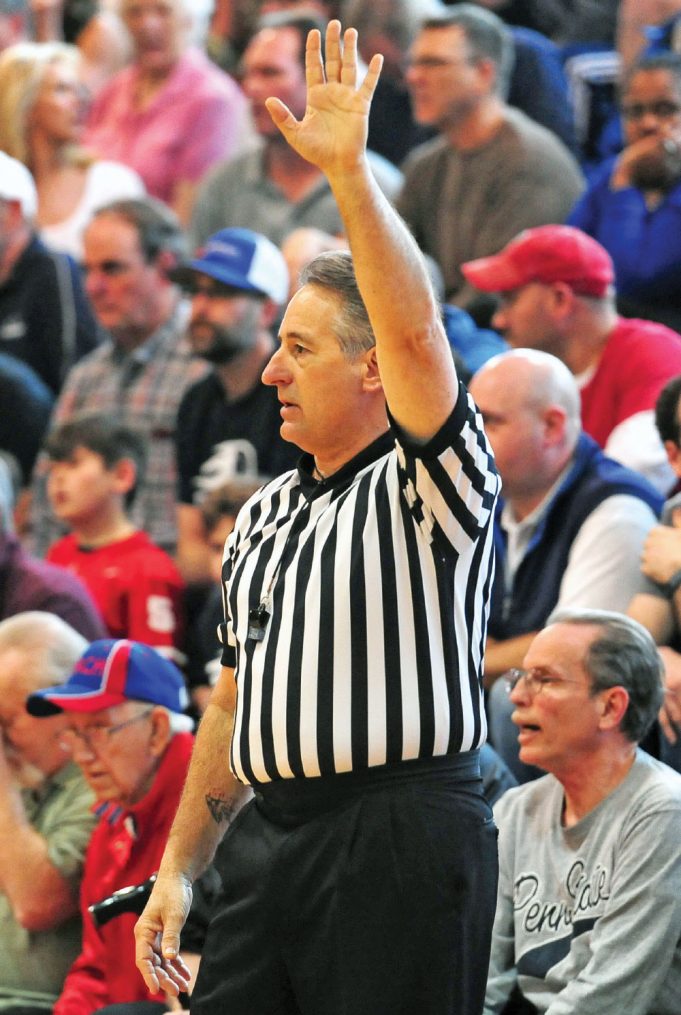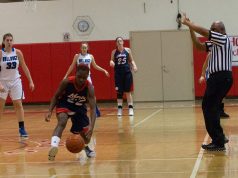An official I know was having a tough night in one of the rural barns around here. The fans were braying, the coaches were chirping, the players were growling, the baby needed changing — you know the drill. Tensions built and halftime came just soon enough, but he didn’t waste his free time. He ran off the concession stand guy for some sin. The game would not resume, he declared, until this person left the premises. Now, he was dealing with an angry and hungry mob.
Find 50 things wrong with this picture; you have one minute.
It isn’t expressly stated in any rulebook, and many officials either forget this or just don’t understand: The referee’s primary job is to run the game. Some of us seem to think that once we’ve met the captains, checked the book and tossed the ball, we just spend the rest of the evening calling the game and hoping things go well: nope. Many assigners specifically designate who they want refereeing a game; it’s the crewmember with the experience, presence, knowledge and common sense to make sure all the things that could go wrong don’t. They want a referee who does something about issues as they arise and heads off the rest before they do.
Two potential trouble spots are the help at the scorer’s table and the aforementioned townsfolk — the parents, students, cleaners, cops and — yes — even the guy burning the burgers. If any of these principalities gets out of hand, things will go someplace you don’t want. As the referee, you have it in your hands to keep it from getting that far and should be using the game administrator to help. Here’s how it works.
In a perfect world, the timer and scorer pass the night in anonymity, mirthfully cooperating and successfully reading your mind at every turn. Meanwhile, the rabble is too busy watching the game to bother with you; even if they don’t love your work, they at least express themselves in a way that wouldn’t ruffle the monsignor, were he in attendance. In the real world, neither of these always happens.
When you walk into the building, the first face you want to see is the game administrator. This is the person the school appointed to maintain order, which includes helping you maintain order. Get him or her on your side before there’s anything to do, yet. Build a rapport; if you know each other — great! (Re)secure their agreement that if you need help with an issue they’ll be there to assist and do everything necessary to deal with trouble. Usually, that’s enough, as most admins take their job seriously; they might get busy doing other things, but they’ll tilt their ear toward the gym and make a timely reappearance when the shrieks start getting louder.
Others, however, seem to take glee in your sorrows. You’ll pick that up from them quickly (or know ahead of time) and you should plan accordingly. In these cases, you’ll need to replace, “Please look after it, when I need help” with “When I need help, I’ll hold up the game until you can get it taken care of.” Mildly confrontational, I agree, but you’ve made an absolute statement in front of two or three witnesses; it leaves that person with few options for evasion unless he or she happens to enjoy phone calls from the state office. The school may have hired you for the game at its leisure, but when the game starts, the game administrator should be serving at yours.
Generally, you want the admin to help with any issue not among your direct duties. Don’t address fans, silence the band or censor the cheerleaders yourself; let the game administrator do it. Let the admin handle spectator, utility, software, hardware and culinary issues as he or she sees fit. If the admin is successful, great! If not, be prepared to draw a line in the sand: “Sorry, I asked you to remove this person.” “When I asked you to get someone to keep the lane dry, I really meant it; I’ll wait.”
Once you’ve picked your battle, the only option you and the admin have is to follow through until it’s won. Sociologists say that fans go by the actions of the coach, and this stretches to the administrator if he or she seems to be getting away with blowing you off. Don’t let that happen, even if it means planning on never coming back because of it.
The table is another story. These people are often loyal servants and the same faces you’ve been looking forward to seeing for the past 15 years. They’re never a problem and things go wonderfully. In other cases, you might still know them well, but they’re as trustworthy as a butcher with bills to pay and a lead finger: The timer always remembers to forget starting the clock when the chips are down. The scorer mistakes the captain for a benchwarmer when it’s her fourth foul. They both greet every signal you make with ones of their own. Keep ahead of them.
On my own crew, the three of us divide monitoring responsibilities at every stoppage. While one of us is reporting a foul or managing the restart, a second is watching the players and the third is auditing the table by checking the scoreboard; he’s making sure it reflects what just transpired. Malevolent tables need to be watched like a hawk. Inexperienced or overwhelmed ones merit the same. Good ones should get your attention simply because they appreciate it. Never let your only heir pack your parachute and never abdicate the accounting of the game totally to the table, no matter who they are. If they’re struggling, see about getting the admin to coach them a bit. If they’re truly up to no good, make a choice: Do you want to look bad getting the AD to replace them or look bad letting the game-winning shot be made by a kid with five fouls? Hint: Remember why you were given the job.
As the referee, you can have the building cleared if that’s what it takes; if your control is really that weak, though, someone will have burned it down before you get the chance. Instead, commit to these behaviors: Be proactive and affirmative for the duration of your visit, but only be assertive when you aren’t getting the help you need.
If you and your crewmates project a professional image, it might still be the three of you against 3,000 opponents some nights … but it will still be about even.
What's Your Call? Leave a Comment:
Note: This article is archival in nature. Rules, interpretations, mechanics, philosophies and other information may or may not be correct for the current year.
This article is the copyright of ©Referee Enterprises, Inc., and may not be republished in whole or in part online, in print or in any capacity without expressed written permission from Referee. The article is made available for educational use by individuals.


















